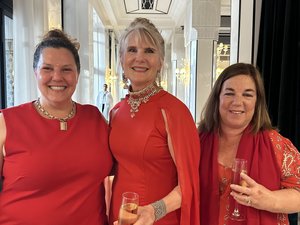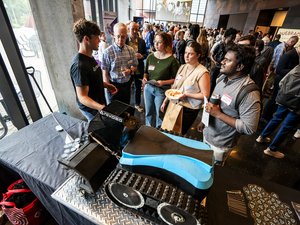
Caroline Karanja has always had diversity at the forefront of her mind. Throughout her tech career, she has noticed that different companies faced similar challenges surrounding workplace inclusion.
Karanja had dozens of meetings and conversations with others about the importance of feeling included in their companies. She realized that the time she spent having these discussions could be applied to building a company that create solutions for these diversity issues.
She started 26 Letters in October 2016, an online platform that creates assessments and action plans for companies to increase diversity and inclusion in the workplace.
“It was really something that grew organically,” Karanja said. Scaling a solution around issues of diversity and inclusion is going to be the biggest way to make an impact, she said. Karanja has since been joined by co-founder Josh Thelemann in early 2017.
26 Letters collects data from client companies about employees' experiences, then builds an assessment piece around it, most often in the form of a survey. Named after the number of letters in the alphabet, 26 Letters hopes to make people conscious of the culture and language used while trying to build more inclusive workplaces.
“Once a company has a baseline, they can start taking action steps,” Karanja said. Instead of looking at diversity and inclusion as something to deal with all at once, 26 Letters helps clients identify smaller contributing factors to company culture. It then suggests initiatives to build up different aspects of the company.
“This way they can look at what’s going right and what’s going wrong [with each issue],” Karanja said. Taking it one small step at a time has proven much more effective. 26 Letters also provides consulting and in-person workshops in addition to the survey-type assessments they offer clients – on May 1-2, they are collaborating with Clockwork to host a workshop in Minneapolis, inviting companies to learn more about embracing cultural diversity in the workplace.
Karanja explained her platform further by mentioning examples of action plans that companies have taken. If a company’s biggest challenge is that employees don’t feel connected, then “lunch and learns” is something they can try to conquer this problem. “It’s about figuring out what works best for them and their company culture.”
Each company is unique in their culture and the way they run, Karanja said. The goal of 26 Letters is not to make every company culture the same – rather, it’s to find what’s different about each company and use that to improve diversity and inclusion challenges. “It depends on the company’s own goals,” Karanja said.
Due to being in the process of negotiating partnerships with other companies in the Twin Cities and San Francisco Bay area, Karanja didn’t name specific clients. However, she did say that “hundreds of people have gone through the survey assessment process” and that “dozens” of leaders are doing things with diversity and inclusion within their organizations. “We’re fully bootstrapped and looking to grow as a team,” Karanja said.
Karanja knows firsthand that women are typically underrepresented in the technology field. “Statistically, it sucks,” she said. "You have to find ways to work around it."
Gender disparities are a big problem in the tech world – one that can't be solved overnight. Rather, Karanja tries to work away at specific aspects of the issue in 30-day increments. This could include things like connecting women-led startups to potential sources of capital or networking with other founders in their same field.
Karanja named the power of networking and connecting with others in the tech world, believing in what you have, and reaching out to startups in other cities as ways to continue building a successful startup.
The 26 Letters founder is also passionate about the building the lives of professionals of color in the Twin Cities. “I care a lot about this region,” Karanja said, mentioning a statistic from Make It. MSP. that professionals of color were 77 percent more likely to leave the region in the past five years than white professionals. This is the type of statistic 26 Letters is trying to reverse.








